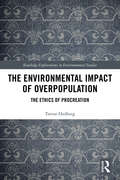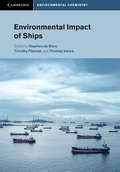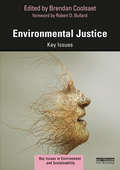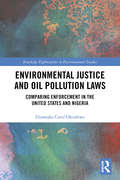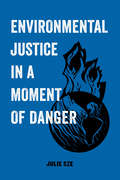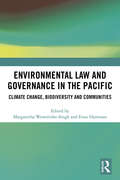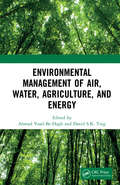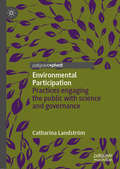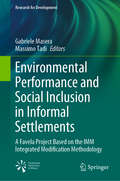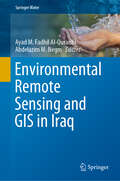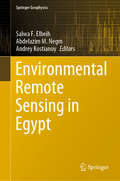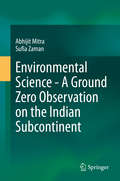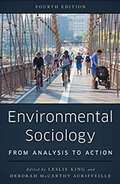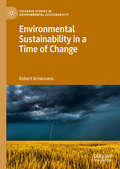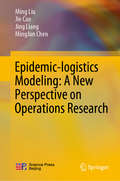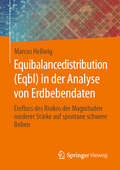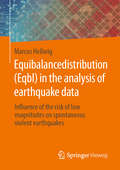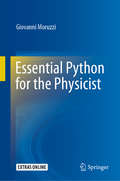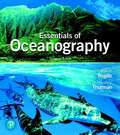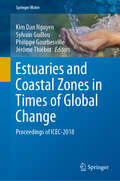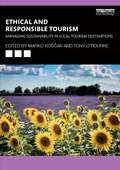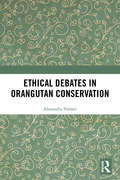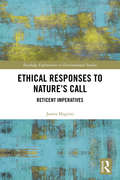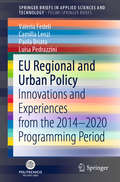- Table View
- List View
The Environmental Impact of Overpopulation: The Ethics of Procreation (Routledge Explorations in Environmental Studies)
by Trevor HedbergThis book examines the link between population growth and environmental impact and explores the implications of this connection for the ethics of procreation. In light of climate change, species extinctions, and other looming environmental crises, Trevor Hedberg argues that we have a collective moral duty to halt population growth to prevent environmental harms from escalating. This book assesses a variety of policies that could help us meet this moral duty, confronts the conflict between protecting the welfare of future people and upholding procreative freedom, evaluates the ethical dimensions of individual procreative decisions, and sketches the implications of population growth for issues like abortion and immigration. It is not a book of tidy solutions: Hedberg highlights some scenarios where nothing we can do will enable us to avoid treating some people unjustly. In such scenarios, the overall objective is to determine which of our available options will minimize the injustice that occurs. This book will be of great interest to those studying environmental ethics, environmental policy, climate change, sustainability, and population policy.
Environmental Impact of Ships (Cambridge Environmental Chemistry Series)
by Stephen De Mora Timothy Fileman Thomas VanceShipping is responsible for transporting 90% of the world's trade. This book provides a comprehensive review of the impact shipping has on the environment. Topics covered include pollutant discharges such as atmospheric emissions, oil, chemical waste, sewage and biocides; as well as non-pollutant impacts including invasive species, wildlife collisions, noise, physical damage, and the environmental effects associated with shipwrecks and shipbreaking. The history of relevant international legislation is also covered. With chapters written by eminent international authors, this book provides a global perspective on the environmental impact of ships, making it a useful reference for advanced students and researchers of environmental science, as well as practitioners of maritime law and policy, and marine business.
Environmental Justice: Key Issues (Key Issues in Environment and Sustainability)
by Brendan CoolsaetEnvironmental Justice: Key Issues is the first textbook to offer a comprehensive and accessible overview of environmental justice, one of the most dynamic fields in environmental politics scholarship. The rapidly growing body of research in this area has brought about a proliferation of approaches; as such, the breadth and depth of the field can sometimes be a barrier for aspiring environmental justice students and scholars. This book therefore is unique for its accessible style and innovative approach to exploring environmental justice. Written by leading international experts from a variety of professional, geographic, ethnic, and disciplinary backgrounds, its chapters combine authoritative commentary with real-life cases. Organised into four parts—approaches, issues, actors and future directions—the chapters help the reader to understand the foundations of the field, including the principal concepts, debates, and historical milestones. This volume also features sections with learning outcomes, follow-up questions, references for further reading and vivid photographs to make it a useful teaching and learning tool. Environmental Justice: Key Issues is the ideal toolkit for junior researchers, graduate students, upper-level undergraduates, and anyone in need of a comprehensive introductory textbook on environmental justice.
Environmental Justice and Oil Pollution Laws: Comparing Enforcement in the United States and Nigeria (Routledge Explorations in Environmental Studies)
by Eloamaka Carol OkonkwoThis book explores the relationship between oil pollution laws and environmental justice by comparing and contrasting the United States and Nigeria. Critically, this book not only examines the fluidity of oil pollutions laws but also how effective or ineffective enforcement can be when viewed through the lens of environmental justice. Using Nigeria as a case study and drawing upon examples from the United States, it examines the legal and institutional challenges impacting upon the effective enforcement of laws and provides a contrasting view of developed and developing countries. Focusing on the oil and gas industry, the book discusses the laws and international acceptable standards (IAS) in these industries, the principles behind their application, the existing barriers to their effective implementation, and how to overcome those barriers. Utilising an environmental justice framework, the book demonstrates the synergy between policy-making, human rights, and justice in oil-producing regions as well as addressing the importance of protecting the rights of minorities. Through a comparative analysis of the United States and Nigeria, this book draws out enforcement approaches and mechanisms for tackling oil-related pollution with a view to reducing environmental injustice in developing countries. Examining the role of NGOs in pursuing environmental justice matters, the book showed the regional courts as one avenue of overcoming the enforcement challenges faced by the developing countries. This book will be of great interest to students and scholars of environmental law, environmental justice, minorities' rights, business and human rights, energy law, and natural resource governance.
Environmental Justice in a Moment of Danger (American Studies Now: Critical Histories of the Present #11)
by Julie Sze“Let this book immerse you in the many worlds of environmental justice.”—Naomi Klein We are living in a precarious environmental and political moment. In the United States and in the world, environmental injustices have manifested across racial and class divides in devastatingly disproportionate ways. What does this moment of danger mean for the environment and for justice? What can we learn from environmental justice struggles? Environmental Justice in a Moment of Danger examines mobilizations and movements, from protests at Standing Rock to activism in Puerto Rico in the wake of Hurricane Maria. Environmental justice movements fight, survive, love, and create in the face of violence that challenges the conditions of life itself. Exploring dispossession, deregulation, privatization, and inequality, this book is the essential primer on environmental justice, packed with cautiously hopeful stories for the future.
Environmental Law and Governance in the Pacific: Climate Change, Biodiversity and Communities
by Margaretha Wewerinke-Singh Evan HammanThis volume examines environmental law and governance in the Pacific, focusing on the emerging challenges this region faces. The Pacific is home to some of the world’s most astonishing biological and cultural diversity. At the same time, Pacific Island nations are economically and technically under-resourced in the face of tremendous environmental challenges. Destructive weather events, ocean acidification, mining, logging, overfishing, and pollution increasingly degrade ecosystems and affect fishing, farming, and other cultural practices of Pacific Islanders. Accordingly, there is an urgent need to understand and analyse the role of law and governance in responding to these pressures in the Pacific. Drawing on academic and practitioner expertise from the Pacific region, as well as Europe and the United States, this unique collection navigates the major environmental law and governance challenges of the present and future of the Pacific. Environmental Law and Governance in the Pacific discusses 21 Pacific Island countries and territories, including Cook Islands, Fiji, Papua New Guinea, Solomon Islands, Vanuatu, and Samoa, and a broad range of themes, such as deep-sea mining, wetlands and mangroves, heritage, endangered species, human rights, and access to justice, are addressed, thus providing a comprehensive and state-of-the-art overview of environmental law and governance within specific jurisdictions as well as across the Pacific region as a whole. This volume will be essential reading for students and scholars interested in environmental law and governance in the Pacific region, as well as policy-makers, practitioners and NGOs involved in the development and implementation of environmental law and policy.
Environmental Management of Air, Water, Agriculture, and Energy
by Ahmad Vasel-Be-Hagh David S.K. TingEnvironmental Management of Air, Water, Agriculture, and Energy brings together the most current state of knowledge on four major elements for sustaining life on planet Earth: air, water, food, and energy. It examines how green technology aids in mitigating the global water, energy, and climate change crises, including the use of electrostatic force and green infrastructure. The concepts of underwater vegetation and aquatic cultivation, as well as vertical farms, are presented to spark discussion on emerging water-energy-food nexus lessons, experiences, and opportunities. This book takes a comprehensive global-scale approach to examining potential future environmental scenarios and outcomes. Features: Analyzes the most recent research findings in each of the areas covered Synthesizes the state-of-the-art understanding Recommends ways to strive forward and to shape future research Serves as an educational tool for educators and students Supported by detailed examples and case studies, this book serves not only as an up-to-date source of information for environmental experts and researchers in the field, but also as an educational tool for relevant undergraduate and graduate courses. It is also suitable for industry professionals concerned with preserving planet Earth for generations to come.
Environmental Participation: Practices engaging the public with science and governance
by Catharina LandströmThis book introduces environmental participation as a distinct field comprising diverse practices. It presents examples of public participation specifically in environmental science, decision making and expertise. The first chapter introduces the science studies perspective and the key concepts that underpin the argument for approaching such a range of practices as a coherent field. The following three chapters explore a wide range of practical examples of how the public can participate in all three domains. Drawing on her experience with a variety of transdisciplinary projects Landström discusses topics including the coproduction of knowledge about flooding, community involvement with radioactive waste disposal and collaborative water quality modelling. She then goes on to cover citizen science and social movement expertise as environmental participation practices. The concluding chapter reflects on the challenges as well as future opportunities of environmental participation. This book is aimed at readers from a variety of academic and non-academic backgrounds and will be a great interest to social and natural scientists, students and practitioners.
Environmental Performance and Social Inclusion in Informal Settlements: A Favela Project Based on the IMM Integrated Modification Methodology (Research for Development)
by Gabriele Masera Massimo TadiThis book discusses the potential of a systemic and multidisciplinary design approach to improve urban quality, health, livability, and inclusiveness for people living in informal settlements. In most instances, attempts to address informal settlements lack an adequate assessment of their impact on the wider built environment and implementation of the UN’s Sustainable Development Goals. The Integrated Modification Methodology (IMM), introduced here, offers a systematic, multidisciplinary design tool encompassing several of the aspects that define the environmental performance of urban systems. The book also demonstrates the application of the methodology to an informal settlement, proving its potential to guide systemicurban transformations, also in urban areas lacking formal planning. The case study investigated is in the Rocinha favela in Rio de Janeiro, which ischaracterized by poor water quality, lack of drainage and sanitation systems, and very few green spaces. Based on a rigorous methodology, the process described here can also be applied in similar contexts around the world.
Environmental Remote Sensing and GIS in Iraq (Springer Water)
by Ayad M. Fadhil Al-Quraishi Abdelazim M. NegmThis unique book focuses on remote sensing (RS) and geographical information systems (GIS) in Iraq. The environmental applications include monitoring and mapping soil salinity and prediction of soil properties, monitoring and mapping of land threats, proximal sensing for soil monitoring and soil fertility, spatiotemporal land use/cover, agricultural drought monitoring, hydrological applications including spatial rainfall distribution, surface runoff and drought control, geo-morphometric analysis and flood simulation, hydrologic and hydraulic modelling and the effective management of water resources. Also, this book assesses the impacts of climate change on natural resources using both RS and GIS, as well as other applications, covering different parts of Iraq. The book chapters include tens of maps extracted from the remotely sensed datasets, in addition to tables and statistical relations obtained from the results of the studies of the chapters' authors. These studies have been conducted in different parts of Iraq; in the north (Kurdistan region) with its mountainous and undulating lands, in western parts which have desert soils, and in central and southern Iraq where there are salty soils, dunes, wetlands, and marshes.The book is written by distinguished scientists from Iraq, China, USA, Italy, Iran, Germany, and the Czech Republic who are interested in the Iraqi environment. The book is therefore a useful source of information and knowledge on Iraqi environment for graduate students, researchers, policy planners, and stakeholders in Iraq as well as similar regions.
Environmental Remote Sensing in Egypt (Springer Geophysics)
by Abdelazim M. Negm Salwa F. Elbeih Andrey KostianoyThis book presents a comprehensive selection of applications employed in environmental remote sensing using optical and thermal infrared satellite-sensors aiming to map natural resources, crops, groundwater, surface water, aquatic ecosystem, land degradation, air quality, renewable energy, regional resources, and climate-related geophysical processes. The technologies presented in this book also include satellite images, space-borne radar sensors focusing on the most versatile one, data from synthetic aperture radar (SAR), scatterometers and radar altimeters in Egypt. This volume also presents a thorough explanation of the remote sensing role showing physical fundamentals of the climate change phenomenon including gas emissions, and the impact on resources concerning the sustainable development of Egypt. Besides, the book includes an analysis of oil pollution in both Mediterranean and Red Seas This book is intended for environmental policymakers working in Egypt as well as scientists working with remote sensing technologies in highly populated arid regions.
Environmental Science - A Ground Zero Observation on the Indian Subcontinent: A Ground Zero Observation On The Indian Subcontinent
by Abhijit Mitra Sufia ZamanThis book provides a cross-sectoral, multi-scale assessment of different environmental problems via in-depth studies of the Indian subcontinent. Data collected from different ecosystems forms a strong foundation to explore the topics discussed in this book. The book investigates how mankind is presently under the appalling shadow of pollution, climate change, overpopulation and poverty. The continuing problem of pollution, loss of forests, disposal of solid waste, deterioration of environment, global warming and loss of biodiversity have made nations aware of environmental issues. Many countries are desperately trying to move away from this adverse situation through technological development and policy level approaches. Through a number of case studies the authors provide details of ground level observations of the most environmentally stressed regions in the Indian subcontinent and beyond.
Environmental Sociology: From Analysis to Action (G - Reference, Information and Interdisciplinary Subjects Series)
by Leslie King Deborah McCarthy AuriffeilleEnvironmental Sociology: From Analysis to Action illustrates how sociological perspectives can help us better understand the causes and consequences of environmental problems and provides examples of efforts to ameliorate these problems. <p><p>The fourth edition of this environmental sociology reader includes 22 edited excerpts (10 of them new to this edition) that address, among other things, environmental inequalities, knowledge creation, media, and perspectives on disaster. The selected pieces use a variety of sociological perspectives, including environmental justice, power structure research, ecological modernization, ecological footprint, and more, to examine a wide range of environment-related topics.
Environmental Sustainability in a Time of Change (Palgrave Studies in Environmental Sustainability)
by Robert BrinkmannEnvironmental Sustainability in a Time of Change is the first book in a new Palgrave series on Environmental Sustainability. It takes a fresh look at the dynamic field of environmental sustainability by exploring the interconnections between climate change, water, energy, waste, land use, ecosystems, food, and transportation. It also provides an extensive summary on sustainability management, data analysis, mapping, and data sources. Brinkmann highlights how environmental sustainability challenges are distinctly different in the developed world, where sustainability is largely a choice, versus the developing world, where many struggle with basic existence due to war, migration, and water or food scarcity. He takes a broad systems and historic approach to contextualize environmental sustainability prior to the 1987 Brundtland Report and utilizes many contemporary examples throughout the text, analyzing numerous case studies from many areas of the world including China, Yemen, Malaysia, Egypt, and Florida. This book questions traditional approaches to sustainability that highlight the need for an equal balance of economic development, environmental protection, and social equality to achieve sustainability. This book focuses on a new line of thinking that places environmental sustainability as the key foundation in how to manage sustainability in a time of change. Our planet is quickly becoming environmentally unsustainable due to global consumption and unsustainable economic development and it is high time for a fresh approach. This book will be of great value to academics, practitioners, and students interested in environmental sustainability from a myriad of fields including geology, geography, biology, ecology, economics, business, sociology, anthropology, and other areas that intersect the interdisciplinary field of sustainability.
Epidemic-logistics Modeling: A New Perspective on Operations Research
by Jing Liang Jie Cao Ming Liu MingJun ChenThis book is the first work to conduct the emergency logistics optimization problem under the epidemic environment (whether natural or man-made), which provides a new perspective for the application of optimization theory. In this book, the research methods involve epidemic dynamics, scenario-based emergency decision-making method, big data which combines the traditional and emerging technologies. The authors take epidemic outbreak as the research object and deeply integrate the epidemic spread model with the optimization model of emergency resource scheduling, which opens up a novel application area of operations research.
Equibalancedistribution (Eqbl) in der Analyse von Erdbebendaten: Einfluss des Risikos der Magnituden niederer Stärke auf spontane schwere Beben
by Marcus HellwigDas Buch beschreibt die Einschätzung des Risikos und der Wahrscheinlichkeit des Eintretens von Schäden gemäß Richterskala. Es erläutert die Verbindung der Wahrscheinlichkeitstheorie extremwertiger Prozesse mit Beispielen aus den Wissenschaften der Erdbebenbeobachtungen.
Equibalancedistribution (Eqbl) in the analysis of earthquake data: Influence of the risk of low magnitudes on spontaneous violent earthquakes
by Marcus HellwigThe book describes the assessment of the risk and probability of occurrence of damage according to the Richter scale. It explains the connection of the probability theory of extreme processes with examples from the sciences of earthquake observation. In contrast to many views, the present analysis takes into account the complete population of all measurement data of the magnitudes from 0 to the measured maximum
Essential Classical Thermodynamics (SpringerBriefs in Physics)
by Ulf W. GeddeThis book is a concise, readable, yet authoritative primer of basic classic thermodynamics. Many students have difficulty with thermodynamics, and find at some stage of their careers in academia or industry that they have forgotten what they learned, or never really understood these fundamental physical laws. As the title of the book suggests, the author has distilled the subject down to its essentials, using many simple and clear illustrations, instructive examples, and key equations and simple derivations to elucidate concepts. Based on many years of teaching experience at the undergraduate and graduate levels, “Essential Classical Thermodynamics” is intended to provide a positive learning experience, and to empower the reader to explore the many possibilities for applying thermodynamics in other fields of science, engineering, and even economics where energy plays a central role. Thermodynamics is fun when you understand it!
Essential Python for the Physicist
by Giovanni MoruzziThis book introduces the reader with little or no previous computer-programming experience to the Python programming language of interest for a physicist or a natural-sciences student. The book starts with basic interactive Python in order to acquire an introductory familiarity with the language, than tackle Python scripts (programs) of increasing complexity, that the reader is invited to run on her/his computer. All program listings are discussed in detail, and the reader is invited to experiment on what happens if some code lines are modified. The reader is introduced to Matplotlib graphics for the generation of figures representing data and function plots and, for instance, field lines. Animated function plots are also considered. A chapter is dedicated to the numerical solution of algebraic and transcendental equations, the basic mathematical principles are discussed and the available Python tools for the solution are presented. A further chapter is dedicated to the numerical solution of ordinary differential equations. This is of vital importance for the physicist, since differential equations are at the base of both classical physics (Newton’s equations) and quantum mechanics (Schroedinger’s equation). The shooting method for the numerical solution of ordinary differential equations with boundary conditions at two boundaries is also presented. Python programs for the solution of two quantum-mechanics problems are discussed as examples. Two chapters are dedicated to Tkinter graphics, which gives the user more freedom than Matplotlib, and to Tkinter animation. Programs displaying the animation of physical problems involving the solution of ordinary differential equations (for which in most cases there is no algebraic solution) in real time are presented and discussed. Finally, 3D animation is presented with Vpython.
Essentials of Oceanography
by Alan P. Trujillo Harold V. ThurmanAs the bestselling brief book in the oceanography market, Essentials of Oceanography combines dynamic visuals and a student-friendly narrative to bring oceanography to life. The text’s engaging features and the extensive suite of animations and videos keep students interested and excited about the material. <p><p> The 13th Edition creates an interactive learning experience that provides tightly integrated text and digital offerings to make oceanography approachable and digestible for students. An emphasis on the process of science throughout the text provides students with an understanding of how scientists think and work. The new edition also helps students develop the scientific skill of practicing and interpreting data with new Exploring Data features supported by Mastering Oceanography coaching activities. A new Creature Feature provides fun facts about marine animals to engage students.
Estuaries and Coastal Zones in Times of Global Change: Proceedings of ICEC-2018 (Springer Water)
by Philippe Gourbesville Kim Dan Nguyen Sylvain Guillou Jérôme ThiébotThis book is a collection of extended papers based on presentations given during the ICEC 2018 conference, held in Caen, France, in August 2018. It explores both the limitations and advantages of current models, and highlights the latest developments concerning new numerical schemes, high-performance computing, multi-physics and multi-scale methods, and better interaction with field or scale model data. Accordingly, it addresses the interests of practitioners, stakeholders, researchers, and engineers active in this field.
Ethical and Responsible Tourism: Managing Sustainability in Local Tourism Destinations
by Tony O'Rourke Marko Kos AkEthical and Responsible Tourism explains the methods and practices used to manage the environmental impact of tourism on local communities and destinations. The three core themes of the book – destination management, environmental and social aspects of ethical sustainable development and business impacts – are discussed across both topic and case study chapters, alongside explanatory editorial analysis with all chapters clearly signposted and interlinked. The case studies address specific and practical examples from a global range of examples including sites in Australia, Central America, Europe Union countries, Japan, North America and South America. Used as a core textbook, the linking of theory in the topic chapters, and practice gained through case studies, alongside further reading and editorial commentary, Ethical and Responsible Tourism provides a detailed and comprehensive learning experience. Specific case studies can be used as standalone examples as part of a case teaching approach, and the editorial and discussion elements are designed to be suitable for those simply seeking a concise overview, such as tourism professionals or potential investors in sustainable tourism projects. This book will be essential reading for students, researchers and practitioners of tourism, environmental and sustainability studies.
Ethical Debates in Orangutan Conservation
by Alexandra PalmerEthical Debates in Orangutan Conservation explores how conservationists decide whether, and how, to undertake rehabilitation and reintroduction (R&R) when rescuing orphaned orangutans. The author demonstrates that exploring ethical dilemmas is crucial for understanding ongoing disagreements about how to help endangered wildlife in an era of anthropogenic extinction. Although R&R might appear an uncontroversial activity, there is considerable debate about how, and why, it ought to be practised. Drawing on in-depth qualitative research with orangutan conservation practitioners, this book examines how ethical trade-offs shape debates about R&R. For example, what if the orphan fails to learn how to be an orangutan again, after years in the company of humans? What if she is sent into the forest only to slowly starve? Would she have been better off in a cage? Could the huge cost of sending a rescued ape back to the wild be better spent on stopping deforestation in the first place? Or do we have a moral obligation to rescue the orphan regardless of cost? This book demonstrates that deconstructing ethical positions is crucial for understanding ongoing disagreements about how to help our endangered great ape kin and other wildlife. Ethical Debates in Orangutan Conservation is essential reading for those interested in conservation and animal welfare, animal studies, primatology, geography, environmental philosophy, and anthropology.
Ethical Responses to Nature’s Call: Reticent Imperatives (Routledge Explorations in Environmental Studies)
by James MagriniArguing for a renewed view of objects and nature, Ethical Responses to Nature’s Call considers how it is possible to understand our ethical duties - in the form of ethical intuitionalism - to nature and the planet by listening to and releasing ourselves over to the call or address of nature. Blending several strands of philosophical thought, such as Graham Harman’s Object-Oriented Ontology, W. D. Ross’s prima fathics, Alphonso Lingis’s phenomenological ethics traceable to The Imperative, and Michael Bonnett’s ecophilosophy, this book offers a unique rejoinder to the problems and issues that continue to haunt humans’ relationship to nature. The origins of such problems and issues largely remain obscured from view due to the oppressive influence of the "Cultural Framework" which gives form and structure to the ways we understand, discourse on, and comport ourselves in relation to the natural world. Through understanding this "Cultural Framework" we also come to know the responses we continue to offer in answer to nature’s call and address, and are then in a position to analyze and assess those responses in terms of their potential ethical weight. Such a phenomenon is made possible through the descriptive-and-interpretive method of eco-phenomenology. This renewed vision of the human-and-nature provides direction for our interaction with and behavior toward nature in such a way that the ethical insight offers a diagnosis and provides a potentially compelling prescriptive for environmental ills.
EU Regional and Urban Policy: Innovations and Experiences from the 2014–2020 Programming Period (SpringerBriefs in Applied Sciences and Technology)
by Valeria Fedeli Camilla Lenzi Paola Briata Luisa PedrazziniThe book critically reflects on some of the most important novelties and experimentations in the context of the European Union’s renewed urban and regional policy in the last programming period, 2014-2020. In particular, it examines four main innovations characterizing this period, which emerged as a result of the deep rethinking and reorganization of Cohesion Policy in the spirit of the place-based approach to local development, i.e. the development of the smart specialization strategy, the establishment of macro-regions, the focus on the urban dimension as a horizontal priority, and the role of social innovation in urban policy. Unlike other similar books, it analyzes the urban dimension of the reformed EU cohesion policy, especially focusing on its interplay with the regional dimension, and which has not been fully addressed to date. The book is intended for social scientists engaged in research on European issues, especially from regional and urban perspectives, policy-makers, particularly at the local level, and graduate students interested in regional and urban European matters.
